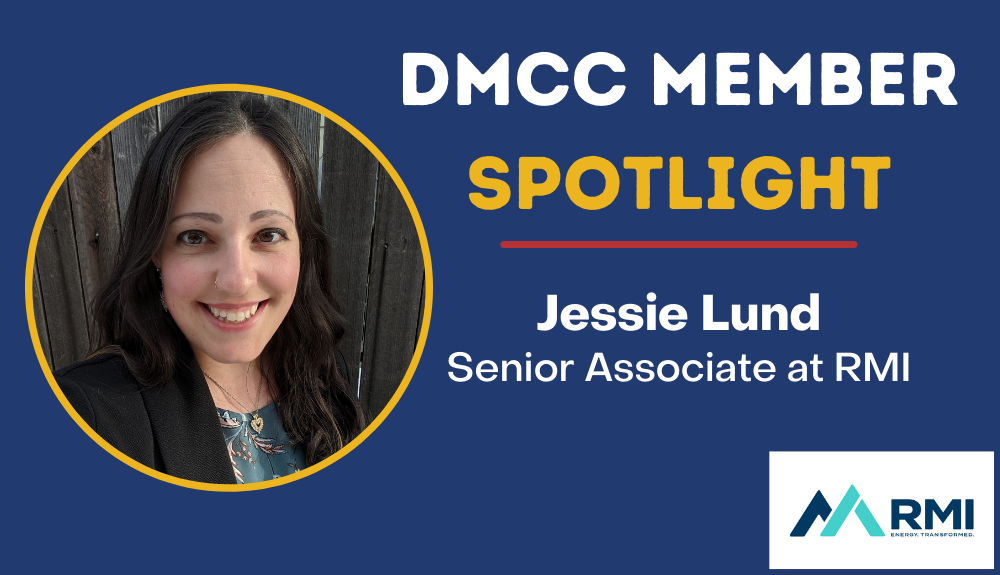We are so excited to have RMI as one of our members at DMCC. RMI is an independent, nonpartisan non-profit working to accelerate the transition to clean energy. Their goal is to transform the global energy system to create a clean, zero-carbon future for everyone. Jessie Lund, Senior Associate at RMI, gave us some insight into her work with RMI’s Carbon Free Mobility Program. Keep reading to learn more about RMI’s clean transportation goals, their biggest successes and what their work looks like in Colorado.
Organization: RMI
Location: Boulder, CO
*Note: The following answers have been summarized from an interview with Jessie Lund
Can you introduce yourself and your role at RMI?
I am a Senior Associate at RMI working on the Carbon Free Mobility Program. I am based out of our Boulder, Colorado office and have been there for 4 years. RMI is an independent, nonpartisan non-profit working to accelerate the clean energy transition with the goal of creating a secure, clean, prosperous, zero-carbon future through market-based change in the world’s most critical geographies. RMI is a global non-profit, and we are committed to working toward a 1.5 degree future and addressing the climate crisis. We work with everyone we can, businesses, policy makers, communities, organizations, to identify interventions that will help us cut greenhouse gas emissions by half over next decade. All my work is focused on transportation sector, specifically the heavy duty sector. I work with amazing partners, including the North American Council for Freight Efficiency (NACFE), to focus on trucking and freight electrification and zero emission buses.

What does RMI’s work look like in Colorado?
As I mentioned, RMI’s work is global. Not a lot of our work is focused on one state or another, rather, it’s industry specific. Of course, we do and have done work specific to Colorado and we have 2 offices here, so there is a strong connection between RMI and Colorado. On the transportation side, we have a program called the Mobility Innovation Lab, which is an in-person office located just outside of Aspen, Colorado that provides opportunities for transportation “passion projects” to get off the ground. The most exciting program participant for me was the team I led at the lab, a group of all Colorado folks (City of Boulder, Boulder Valley School District (BVSD), CU Boulder, Via, etc.) mulling over bus electrification and discussing how they can share charging infrastructure. It’s been exciting to watch their progress, especially since BVSD recently acquired their first all-electric school bus in March.
RMI also does a lot of work with utilities, regulators, and cities regarding how EVs interact with the grid to help them overcome roadblocks and build new business models for this technology. One example in Colorado was a DC fast charging rate study we did for the Colorado Energy Office (CEO). For the study, we provided a comparative analysis of three proposed tariffs designed to meet the needs of the unique loads of electricity required by DC fast chargers. On the trucking side, we have shared all our research with the Colorado Department of Transportation (CDOT), CEO, and the Colorado Department of Health & Environment (CDPHE) to help inform strategy around zero-emission medium and heavy duty vehicles. This isn’t Colorado specific, but one of the analyses I did was looking at what locations in U.S. and Canada are prime targets for electrification, and we identified Colorado as one of the top priority states for electrification.
RMI works to decarbonize energy systems and accelerate the clean energy transition. What does that look like regarding transportation?
When it comes to transportation, RMI is working to end tailpipe emissions and accelerate the clean energy transition. Our goal is to make air cleaner, save lives, and align the transportation sector with that 1.5 degree target I mentioned earlier. To accomplish this goal, we are focused on 3 specific areas: electrifying passenger fleets, advancing zero-emissions freight, and building EV charging infrastructure. These involve technology development, working with policy makers, capacity building, and education with industry for how we’re going to finance everything.
Historically, we have been focused on diesel vehicles on the road. We’ve done a lot of research and reporting around efficiency measures and have reviewed over eighty technologies to help fleets increase their efficiency. Over the last four years, RMI has taken the focus to battery electric vehicles (BEVs) and understanding where this technology makes sense for industry, what it will look like over next 5-10 years, and what the comparative analysis is with other alternative fuel vehicles. Our focus going forward is BEVs – we believe the future is electric.
What is the biggest barrier you have faced in helping electrify transportation? What about the biggest success?
Specific to medium and heavy-duty electrification, I’d say the biggest barrier is the bespoke nature of each fleet and deployment. I didn’t know anything about the trucking industry when I started at RMI, but over the last four years I have learned a lot. The biggest takeaway for me has been how diverse the trucking industry is – there is no fleet or depot that’s the same as the next. Fleets are all different in terms of vehicle type, operations routes, duty cycles, and other needs, and when you factor in electrification (charging structure, utilities, etc.), helping fleets understand what it looks like for them to deploy vehicles becomes even more specialized and unique. Whether it’s a pilot project or to scale, it’s hard to streamline the electrification process because of the diversity of the trucking sector.
We have had many successes along the way, but I would say our biggest one was securing philanthropic funding for this work, for the first time in NACFE’s history, about a year ago. The money itself is great because it allows us to do our work, but the real success is how far the money allows us to reach within the industry. We have been working with the trucking industry for the last decade and have had a lot of success there, but for the electric truck sector we were having to charge for reports in order to recoup the cost of the research. This meant that we couldn’t share our results with the industry at large, which is our goal. The funding we secured allowed us to share our reports for free to anyone that was interested so more people could take advantage of the research. Looking at the numbers recently, I was excited to find that the funding allowed us to expand our reach by more than 50x over the last year. It’s a huge success to be able to share the great work we’re doing with the industry and help move it forward.
As a stakeholder at DMCC, how has that engagement helped you achieve your climate change goals? How can we continue to support your efforts?
To date, a lot of transportation electrification work has been focused on light duty vehicles, which has allowed the technology to mature. A big part of our engagement with DMCC has been around educating advocates and experts of light-duty EVs about opportunities and challenges for medium and heavy-duty electrification. We want to expand the discourse of electrification to include all of transportation rather than just passenger vehicles and light-duty fleets, and DMCC has been instrumental in giving us a platform to do this. I personally had the opportunity to attend the Annual Stakeholder Meeting and the Colorado Clean Fuels Roundtable, both of which were great experiences and helped us get information about medium and heavy-duty vehicles out to more people. RMI’s engagement with DMCC also helps us keep up to date with what is happening in our region, best practices, and where we can make the most impact.
Is there anything you are looking forward to in 2021?
Absolutely! 2021 is gearing up to be a huge year for us. We have a big event coming up this fall called Run on Less Electric. It’s the 3rd event in our Run on Less series that we started in 2017. Since then, we have been hosting events every other year, showcasing real world advances and highlighting best of the best in the industry. The first two events in the series were focused on improving efficiencies of diesel vehicles – this is the first one we’re doing for electric trucks. The event hasn’t happened yet, but it’s already surpassing expectations. We were hoping to get 10 fleets to participate and ended up with 13 across U.S. and Canada. There is a huge diversity among the participating fleets, both in geography and vehicle type. Less than half the participants are operating in California (we wanted to make sure this wasn’t just a California event), and the fleets have a wide range of weight classes (Class 3 to Class 8), from delivery vans to big rigs. Although none of the vehicles participating in the run are fleets operating in Colorado, one of the participating trucks is from Colorado manufacturer, Lightning eMotors – that vehicle is operating in NYC for DHL. The event will kickoff at the Advanced Clean Transportation Expo in September and we are very much looking forward to it.
See more DMCC Member Spotlights or learn more about joining DMCC today!




